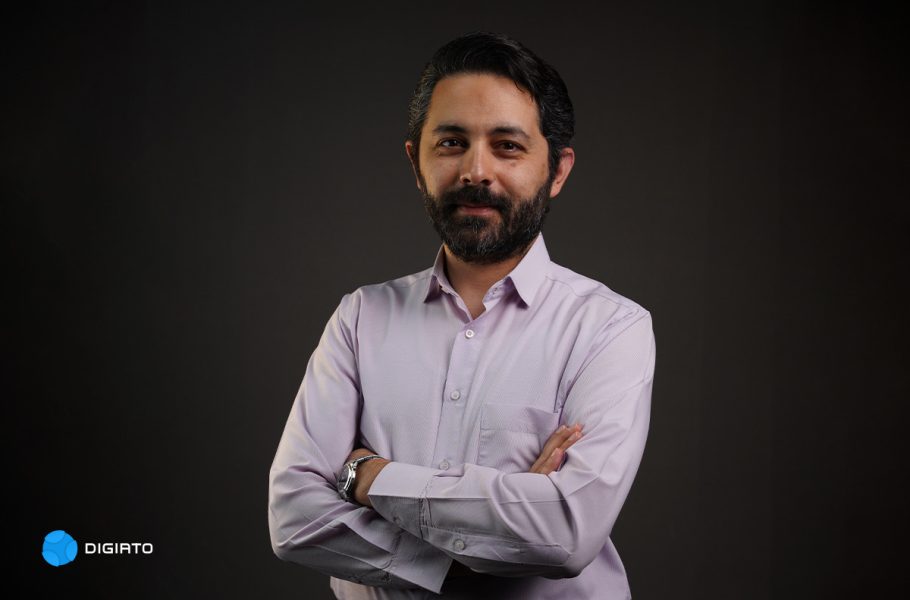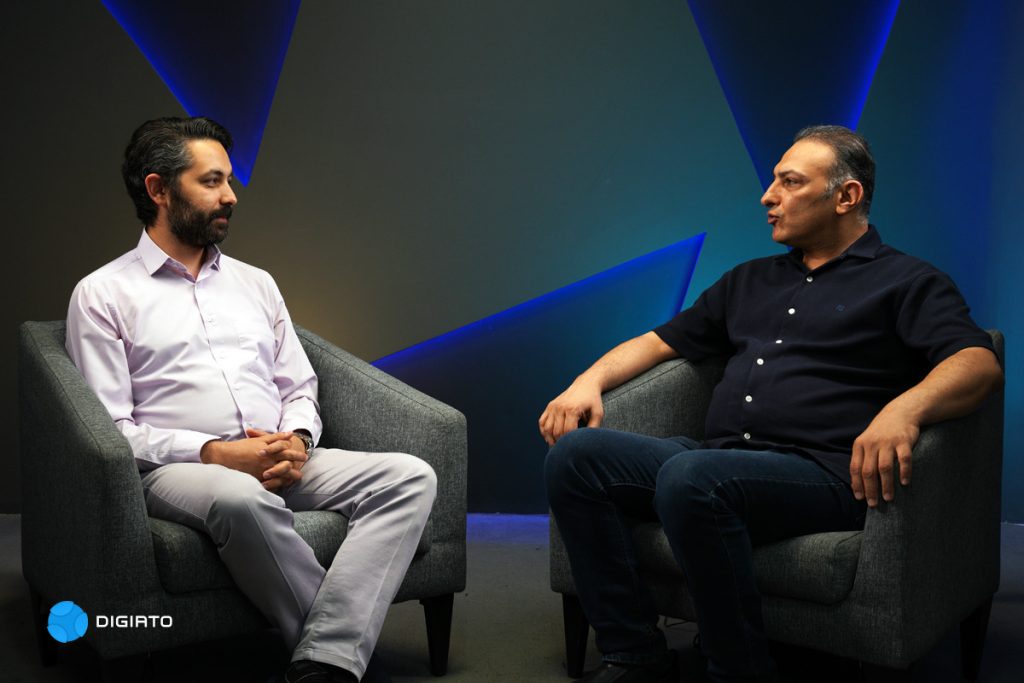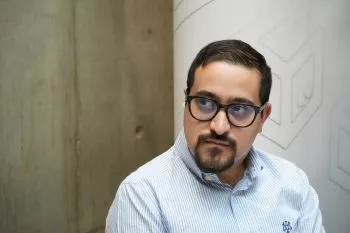
Digiato’s Interview with the CEO of Chainova Startup Studio: Give Us a Problem, Get a Startup
Ehsan Nouri, CEO of Chainova, elaborated on the startup studio model, the challenges and opportunities of this ecosystem.
In the rapidly evolving world of the digital economy, various models have emerged to nurture startups. One such model is the startup studio, which reduces the risk of failure and increases the chance of success for startups by combining experience, capital, and structured processes. Chainova is a pioneer in this field in Iran, and over the past three years, it has focused on advanced technologies like blockchain and fintech to launch several successful startups. Recently, it also completed a full cycle in one of these ventures and exited successfully.
In an exclusive interview with Digiato, Ehsan Nouri, CEO of Chainova, elaborated on the startup studio model, the challenges and opportunities of this ecosystem, and the details of the startups backed by Chainova.
What exactly is a startup studio, and how does it differ from other acceleration and business development models?
Startup studios are business models dating back to 2002, almost a decade before accelerators emerged. The initial idea was proposed by entrepreneur Bill Gross, who had extensive experience launching startups—both successful and failed. He decided to replicate that experience, not through a single startup, but across multiple teams and ideas. The philosophy behind this model is to leverage past experience to foresee common causes of failure and reduce risks. Although challenging, startup studios have proven to be effective tools for innovation.
Chainova was founded in 2021 (1400 in the Iranian calendar) with this very approach, in collaboration with and support from Shenasa. It has now been active for over three years.
Could you elaborate more on the operational model of startup studios?
Startup studios follow the same process a natural startup should go through but with more deliberate planning and experience-based insights. The key difference is that accelerators start with a startup, while studios start with a problem—and the output is a startup. We begin with a problem and validate whether it actually exists, using methodologies like Lean Startup. Then, we ideate solutions, assess whether the idea adequately addresses the problem, build an MVP, and evaluate whether there's market demand. These steps are carried out meticulously, drawing from prior experience to increase the likelihood of success. If all stages meet our criteria, a startup is formed, assigned an independent team, receives initial funding, and enters the market. At this stage, it functions somewhat like an accelerator to raise further capital.
You mentioned that startup studios begin with a problem. Where do these problems come from—your own team, individuals, or organizations?
All three sources are possible, but mainly we deal with two. First, our internal team identifies problems through research and ideates based on them. Second—and this is the one we’re more eager to grow—is receiving problems from organizations. This requires cultural development. Globally, mature organizations outsource their problems because such problems already have owners—what we call "problem owners"—which confirms their realness. We offer to solve these problems and return them as sustainable businesses.
The third source is individuals with ideas. If someone is willing to let their idea pass through our validation process and accept the risks, we’re open to it. But many simply believe their idea is brilliant and just want funding—that’s beyond a startup studio’s mission. So the third case is less common.
Tell us more about Chainova’s activities and your business model. When a problem is submitted and a startup team is formed, what exactly is Chainova’s role—investor or founder? What kind of support do you provide?
We play both roles. Every startup studio has a “fund” division that provides financial support. We also act as the founding team or more precisely, as early co-founders. We start from the problem and take it up to the startup formation stage. During this process, additional co-founders and team members join. Finding suitable co-founders is challenging and usually happens in the later stages.
Teams engage in customer interviews, prototyping, MVP development, and market testing—all within the studio. Once the startup is validated and becomes independent, we enter a transition phase—one of the most complex challenges of startup studios. Every startup and team has unique traits. This phase demands leadership and mentoring skills to navigate properly.
After the startup reaches independence, we gradually step back from direct management but continue supporting them with infrastructure, financial, legal, and weekly mentoring support. We ask teams to focus on their core business and market. The final goal is to exit—just as accelerators or venture capital funds aim to do.
Have you managed to exit any startups so far?
Yes, fortunately. Our first exit happened two or three weeks ago with the Polaris project, a blockchain infrastructure startup. Two other exits are also in the pipeline. I think this is the first time we're publicly announcing this news.
Your website says Chainova’s mission is to solve major national challenges through fintech and blockchain. Isn’t that too ambitious or perhaps unattainable?
We’re doing our best to achieve this mission. Entrepreneurship is fundamentally about caring enough to solve problems—whether at a national or global scale. We want our work to help build a better world. That’s our core mission, and we won’t back down from it.
While there’s still a need for cultural change in organizational thinking, analyses show that B2B businesses and various industries offer plenty of innovation opportunities. Many industries have fallen behind in tech. We can solve their problems with technology—and that aligns with our broader mission.
Why limit your technology focus to just blockchain and fintech? Some major challenges might require other technologies.
Great question. Until last year, we introduced ourselves as a blockchain startup studio, but in February 2025, we officially announced we are no longer limited to blockchain. Now, we’re a technology-driven studio, primarily working within the IT domain.
Our initial focus on blockchain came from the team’s prior experience and networks. Also, Shenasa—our partner—has a strategy of investing in lower-risk technologies. Blockchain, despite its challenges, holds significant potential. But feedback showed us that we shouldn't restrict ourselves to any one technology. Now, we’re ready to use any technology that offers an effective solution to a real problem.
Tell us about the startups that have emerged from Chainova. How many are there, and what stage are they in?
So far, we’ve reviewed around 500 problems, and currently have four independent startups: Polaris, MomentSport, Indefi, and Novapay. Many ideas were rejected during validation, but these four successfully passed through the process.
Your first startup was Farchain, focused on pharmaceutical supply chains. What happened with that project and what problem was it addressing?
Farchain addressed a very serious, real-world issue. In 2021, the removal of subsidized currency created major problems in special drugs and medical equipment—key segments of the pharma market. The ones hit hardest were patients. We collaborated with Fanap to design a blockchain-based solution called SCF (Supply Chain Finance). We built a closed-loop token system that complied with regulations and could bring liquidity to the pharmaceutical supply chain.
Unfortunately, the Food and Drug Administration, which was the main problem owner, didn’t cooperate as expected. The pharma sector is complex and lacked sufficient support from other key players like the Social Security Organization. Although we kept trying, eventually the project shifted to a broader field—banking—which led to the creation of the Indefi project.

What problem does Indefi solve, and in what field does it operate?
Indefi is a continuation of the SCF model, which is gaining global traction. This platform allows companies in supply chains to liquidate their receivables more quickly. In line with Central Bank regulations, we use electronic drafts (brat). Banks allocate credit through the platform, and companies can buy, sell, and cash their drafts when needed.
Indefi complies with the latest Central Bank regulations and is industry-agnostic—though some supply chains require customizations.
How does MomentSport function in the fan engagement space, and what problem does it address?
MomentSport began in 2019 with the goal of applying NFTs to sports. In Iran, fan-club relationships are often ineffective. Fans want to influence club decisions but lack meaningful channels to do so. Globally, modern fan engagement is much more advanced and provides both monetary and non-monetary value to clubs.
MomentSport turns key sports moments into NFTs (images or videos). Fans can buy/sell these NFTs, enjoy the experience, earn rewards, and support club revenue. Smart contracts further enhance fan-club interaction. So far, they’ve reached agreements with four Premier League clubs and are in talks with ten more. Since club negotiations took time, they pivoted to focus directly on fans. They now have over 500,000 users and have sold more than 3,000 NFTs. This summer, they aim to launch a secondary market and expand gamification features.
Your next startup, Novapay, operates in the crypto payment space. What sets it apart from similar platforms?
Novapay is a crypto payment facilitator initially designed for foreign tourists in Iran who couldn't use cash. But due to regulatory hurdles, Novapay innovated by having merchants receive rials instead of crypto. This helps resolve some tax and regulatory issues. While we still face challenges, we’re proceeding cautiously—staying compliant while aiming to make life easier for people.
Can you tell us more about Polaris, your recent exit?
Polaris was created in response to the need for shared blockchain infrastructure in Iran. Polaris as a Blockchain as a Service (BaaS) company, now provides infrastructure and applications for companies and startups wanting to use blockchain so they can focus on their core business. Currently, crypto exchanges are among its main clients.
What opportunities does Chainova offer investors, organizations, or individuals interested in startups?
At Chainova, our vision is to create meaningful opportunities for different groups within the startup ecosystem—whether they’re aspiring founders, investors, or organizations facing complex challenges. For individuals who dream of launching their own business but are wary of going it alone, we provide a safer, more structured environment than starting from scratch. Being a solo founder can be incredibly risky and isolating, so we aim to offer a collaborative space where co-founders can grow with support and shared resources.
For investors, Chainova is a place where they can access startups that have gone through rigorous validation and development processes. These ventures aren’t just ideas—they’re businesses built on real problems, with stronger foundations and a greater likelihood of long-term success.
We also see ourselves as a reliable partner for organizations. Often, companies encounter problems that are too complex or outside the scope of their internal teams. In such cases, we invite them to bring those challenges to us. We work through them carefully, and in return, we provide a practical solution—whether it’s a standalone business or an operational model that they can adopt. Of course, this approach requires close collaboration, but it also takes much of the risk and complexity off the organization’s shoulders. That’s what we strive for: to build impactful solutions through shared innovation.












